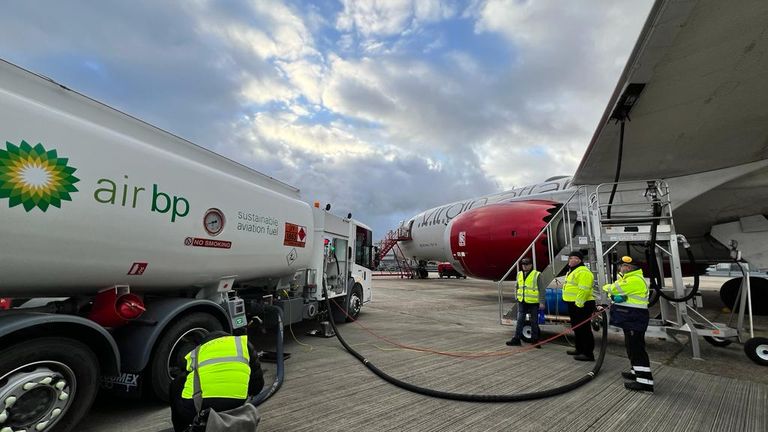An advert for the world’s first transatlantic flight to be 100% powered by so-called sustainable aviation fuel (SAF) has been banned, as the advertising watchdog said it was misleading.
The radio ad, which promoted the transatlantic flight, was misleading in its unqualified “100% sustainable aviation fuel” claim, said regulator the Advertising Standards Agency (ASA).
Money blog: Cadbury’s reacts to call to bring back ‘greatest ever’ bar
Future Virgin Atlantic ads referencing SAF must include information explaining the environmental impact of the fuel, the ASA added.
The decision strikes at airlines’ ability to promote a key plank of their emissions reduction goals.
What did the ad say?
First aired in November, the ad informed listeners about the first long-haul commercial aircraft to fly across the Atlantic using 100% SAF, comprised of sugar from industrial cornstarch and animal fats unsuitable for human consumption.
“On the 28th of November, Virgin Atlantic’s Flight 100 will take to the skies on our unique flight mission from London Heathrow to JFK to become the world’s first commercial airline to fly transatlantic on 100% sustainable aviation fuel,” the ad said.
“When they said it was too difficult, we said: ‘challenge accepted.’ Virgin Atlantic Flight 100. See the world differently.”
No commercial passengers were on board for the journey. Previously airlines were only permitted to use fossil fuels and up to 50% SAF to power their flights.
What was the problem?
A significant proportion of listeners would understand that “100% sustainable aviation fuel” meant that the fuel used was 100% sustainable but that was not the case. Some could be led to believe that there were no negative environmental impacts at all, the ASA said.
In fact, Virgin Atlantic confirmed to the ASA that sustainable aviation fuel produced the same level of CO2 emissions during flight as traditional jet fuel.
While the production cycle of SAF produces less carbon than regular aviation fuel, the emissions created in flight are still “significant”, the ASA said.
And producing SAF can still have wider environmental costs and trade-offs, the agency added.
“Because of that, it’s important that claims for sustainable aviation fuel spell out what the reality is so consumers aren’t misled into thinking that the flight they are taking is greener than it really is,” said the ASA’s director of complaints and investigations Miles Lockwood.
Warning to advertisers
The watchdog issued a warning to businesses seeking to promote their climate mitigation or environmentally friendly measures, saying it expected any claims to be backed up.
Businesses “need to be wary” of using statements like “100% sustainable” or “sustainable” when advertising products and services, Mr Lockwood said.
“Claiming that a product or service is sustainable creates an impression that it is not causing harm to the environment and for that reason we expect to see robust evidence that this is the case.”
Virgin Atlantic’s response
A Virgin Atlantic spokesperson said: “We’re committed to achieving net zero by 2050 and key to this will be using sustainable aviation fuel (SAF), which is one of the most immediate levers to decarbonising long haul aviation.
“SAF is a term used globally by industry and government for fossil-alternative aviation fuels that adhere to specific sustainability criteria.
“While we are disappointed that the ASA has ruled in favour of a small number of complaints, we remain committed to open, accurate and transparent engagement on the challenge of decarbonisation.”

